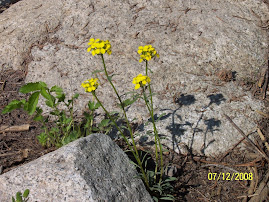There followeth after me today
A youth whose feet must pass this way.
This chasm that has been naught to me
To that fair-haired youth may a pitfall be.
He, too, must cross in the twilight dim;
Good friend, I am building the bridge for him.
A lot of people have quoted this poem, notably President Thomas S. Monson. But do you know the story behind it? Of course you don't, but that's what makes this blog so great: I'm about to tell you.
 The poem first appeared in Dromgoole's 1918 book Rare Old Chums. The "chums" are a little girl and her aging father. The girl "followed [the old man] at his heels, lived upon a word, a glance from him, and was so truly happy if he so much as looked her way." At first the father pays most of his attention to her brother, the only boy in a family of many girls, but the young daughter is not jealous--she's glad because the boy makes her father so happy.
The poem first appeared in Dromgoole's 1918 book Rare Old Chums. The "chums" are a little girl and her aging father. The girl "followed [the old man] at his heels, lived upon a word, a glance from him, and was so truly happy if he so much as looked her way." At first the father pays most of his attention to her brother, the only boy in a family of many girls, but the young daughter is not jealous--she's glad because the boy makes her father so happy.But then tragedy strikes: the son dies, followed soon by the old man's wife. All of the older daughters marry and move away, and the father comes to realize that this loyal, adoring little girl is all he has left. They move to a little cabin by a river and go fishing every day. Life is peaceful, except for the girl's growing fears that her "old chum" will die soon and leave her alone.

On the way to their fishing spot they cross a gulch--deep, but narrow enough to leap across. Each day they notice that the gulch is getting a little wider, and one day the old man says, "I should like to bridge this chasm. It will be beyond all crossing by and by."
The girl notes with sadness that by the time the gulch is too wide for them, her father will not likely be around anymore. "Father," she says, "we can always cross it, as long as you need to."
"Ay," he answers. "But after me? You will travel the road when I am gone."
His words touch her so deeply that she thinks about them all day, until they form themselves into a song in her head, which she calls "Building the Bridge."
Today the poem is well known, but Rare Old Chums seems to be mostly forgotten.
 For some reason, the story is even more moving to me than the poem itself. Maybe it's because in this context the bridge is not just an anonymous, random act of kindness, a considerate gesture for the sake of leaving the world a little better. Rather it's a father's gift to his apprehensive daughter. I have two daughters myself, so I know a little bit about what made that father want to build that bridge.
For some reason, the story is even more moving to me than the poem itself. Maybe it's because in this context the bridge is not just an anonymous, random act of kindness, a considerate gesture for the sake of leaving the world a little better. Rather it's a father's gift to his apprehensive daughter. I have two daughters myself, so I know a little bit about what made that father want to build that bridge.So in a sense, "Building the Bridge" is a Father's Day poem. This is, essentially, what it means to be a father! If you read the whole book (it's less than 100 pages), you'll see that the bridge is symbolic of another chasm that the father bridges for his daughter--one much wider than the gulch they crossed on the way to their fishing spot.
The image below is from the book itself, and will enlarge when you click on it.


